Presenting Oscar's Chosen Supporting Actresses of the Films of 1943.

A cruel nun, a flirtatious nurse, a gypsy rebel, a harried mother, and a wealthy hostess. It's not the elaborate start of a joke, but the nominated characters from the Best Supporting Actress race of 1943. There was only one returning nominee (Gladys Cooper) but in the 1940s all newbie lists were common since the supporting categories had been around less than a decade! Anne Revere and Cooper would eventually become three time Supporting Actress nominees (Only 23 women in history have accomplished that feat, Octavia Spencer the most recent to join the list just last season) but for Paulette Goddard, Katina Paxinou, and Lucille Watson this was their one and only time in Oscar's golden embrace.
THIS MONTH'S PANELISTS
Here to talk about these five nominated turns and either agree with the Academy or crown a new retrospective winner are, in alpha order: Yaseen Ali (cinephile), Kristen Lopez (critic), Rebecca Pahle (critic), Kieran Scarlett (screenwriter) and Nathaniel R (your host here at TFE). Readers (hey, that means you!!!) form the collective final panelist each month. Okay, time for the main event...
1943
SUPPORTING ACTRESS SMACKDOWN
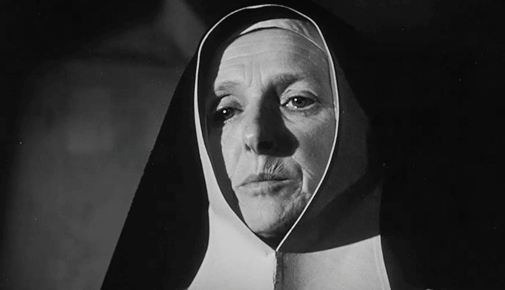
Gladys Cooper as "Sister Marie Therese Vauzous" in The Song of Bernadette
Synopsis: A hard-hearted nun refuses to believe that a poor girl who hasn't studied in her class has seen heavenly visions.
Stats: Then 55 yrs old, 20th film, 5th billed. 2nd of 3 nominations. 16 minutes of screen time (or 10% of the running time)
Yaseen Ali: From my notes upon her introduction: “Her stoic delivery and precise stillness are commanding, but hopefully these pay off later?” In contrast to Bernadette’s other nay-sayers, Cooper easily cuts the most imposing figure as a gatekeeper to credibility. And while she never overplays her resentment of the girl, I did hope that this steely countenance would eventually flicker and let us in. I needn’t have worried: a medical diagnosis late into the film allows Cooper to gloriously melt into shame. This shift from tightly controlled distrust to remorseful sentimentality is a welcome release for her (and us). ♥♥♥
Kristen Lopez: I blame Cooper for splitting the vote leaving the film without a win at all. Cooper’s role as the nun who disbelieves Bernadette is good, but it’s not the best performance in the movie by a long shot. Cooper is the cynic, whose belief in Bernadette is the entirety of her arc, though it’s pointless in the grand scheme of the film. Cooper was a legendary performer and this plays like a “we should have nominated you already” role. ♥♥
Rebecca Pahle: Gladys Cooper sneaks into the Best Supporting Actress category with the coveted “one really good monlogue” move. Her character begins as a sort of ecclesiastical Nurse Ratchet—an eeeevil nun who doubts pure, sweet Jennifer Jones’ visions. Her redemption comes when she tearfully admits that her resentment comes from being jealous that she wasn’t the one chosen for a spiritual visitation. Honestly, kudos for pulling focus from the luminous Jennifer Jones for about 90 seconds. That’s worthy of an Oscar nomination. ♥♥♥
Kieran Scarlett: She fires off both some great one-liners and some long-winded verbal undressings that are fun to watch. One can't help but laugh as Cooper puts a button of “good night” at the end of a long diatribe where she accuses Bernadette of exposing her soul to evil. And even when she eventually comes to empathize with Bernadette's circumstances, Cooper doesn't overplay the emotional evolution. However, it still ends up feeling like serviceable, but not particularly interesting or deep work. ♥♥
Nathaniel R: The Oscars weren't televised until the 1950s so the idea of the "Oscar clip," as selling point is younger than the awards themselves. That said, her 'clip,' is obvious and all it takes to define a supporting performance is one expertly acted scene. Hers is a real whammy as Sister Vazous finally reveals her own sadomasochistic hand. That monologue allows Cooper to dig up this nun's self inflicted miserabilism, her eyes 'burning like the fires of hell,' and explain her purposeful cruelty. I went from hating the otherwise one-note performance to respecting it, with this one magnificent chord. Is that too generous? Better to err on the side of generosity than suffer guilt for the lack of it a la Sister Vauzous. ♥♥♥
Reader Write-Ins: "She was so skilled at playing characters we initially dislike, but in the end their acknowledgement of their own failures are so powerful we can relate to them. " - James (Reader average: ♥♥♥¼)
Actress earns 16¼ ❤s
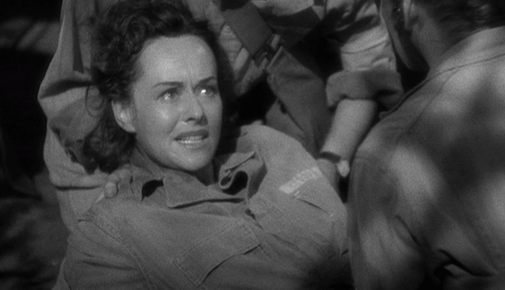
Paulette Goddard as "Lieutenant Joan O'Doul" in Proudly We Hail
Synopsis: A sassy popular nurse finds enormous reserves of stamina and strength in a war zone. She also finds love with a soldier despite, uh, multiple fiancees back home.
Stats: Then 33 yrs old, 19th film, 2nd billed. Her 1st and only nomination. 44 minutes of screentime (or 35% of the running time)
Yaseen Ali: Goddard’s gifts for physical comedy and facial wizardry register instantly – she’s mesmerizing as she stumbles into one faux pas after another, though always landing gamely on her feet. My favourite moment comes during a seemingly innocuous card game: when a suitor makes his case, she balances amusement and indifference, and then exits in a small huff when he receives more attention from her fellow players… but partly because she’s been charmed, too. Despite the episodic nature of the film, Goddard sells the character’s carefree, flirtatious nature without needing to steep her in caricature. Moreover, the offering of her love letters to the doomed men in the infirmary as reading material packs a wallop. ♥♥♥♥
Kristen Lopez: I’m biased about this movie in general. It should have been Veronica Lake who was nominated, dammit! Goddard is actually fantastic in the role as the feisty nurse who doesn’t want to fall in love, but does anyway. Goddard had a long road in Hollywood, and like other performers here it seems they had to give her a nomination at some point. It helped that her character is so patriotic. She’s a ball of fun in an otherwise dour feature. ♥♥♥
Rebecca Pahle: Apologies to Paulette, but this nomination should have gone to Veronica Lake. Lake has far less screentime—spoiler alert, she dies fairly early in the film—but her performance is more interesting and has more impact, and her character arc is more well-defined. Goddard's peformance provides a bit of lightness to this otherwise dour war drama, and she's an engaging screen presence, providing a necessary counterpart to Claudette Colbert's more downbeat character. Still, it's not a particularly original character, and her performance, though serviceable, does nothing unexpected to make it stand out. ♥♥
Kieran Scarlett: Goddard definitely has an advantage over her co-nominees in that she almost feels like a co-lead, particularly during the ensemble film's first half. There's a cumulative effect to Goddard's work in this admittedly shapeless outing. She's a winning presence and seems to have actual ideas about her character beyond what's on the page. I love the way she plays off Veronica Lake in the first half, who probably would have been the nominee were this made today (it never would be). The film's episodic nature doesn't exactly give her a cohesive arc to convey, but it's a charming turn. ♥♥♥
Nathaniel R: Though her first real scene is presented as nervous comedy, there's something quite self-possessed and physically expressive about this performance that I really responded to; Lt. O'Doul can take care of herself, however many men are offering to do that for her. This would be an easy character to perform too broadly or judge, but Goddard takes O'Doul's frivolity seriously -- Isn't that one of the things we're fighting for? What sealed the deal for me was that backward wave, as she leaves a room of wounded, probably doomed, soldiers behind. Moving. Specific. Just right. ♥♥♥♥
Reader Write-Ins: "Goddard’s comic sensibilities sometimes made me forget what kind of film I was watching. (What kind of film was I watching?) But it’s hard not to acknowledge the ease of her charisma and her ability to move beyond the role’s limp call for a shallow, flighty flirt who only needs to find the Right Guy. Smart, magnetic, funny, and an immediate standout. " - Manuel (Reader average: ♥♥♥)
Actress earns 19 ❤s
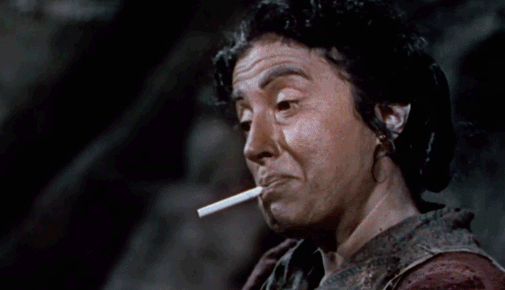
Katina Paxinou as "Pilar" in For Whom the Bell Tolls
Synopsis: A strong-willed gypsy woman leads a pack of guerilla fighters, when her treacherous man isn't up to the task. She teams up with an American soldier on an operation to blow up a bridge.
Stats: Then 43 yrs old, debut film, 10th billed (but with an "and introducing..." tag to set her apart). First and only nomination. 49 minutes of screen time (or 29% of running time).
Yaseen Ali: It’s a small miracle that this gigantic black hole of a film doesn’t swallow up Paxinou’s Pilar along with all its other victims. While we are ostensibly meant to swoon at Cooper and Bergman’s ill-fated romance, Paxinou serves all the political and emotional stakes here. And though the shouting matches between Pilar and her faded glory husband might seem meaty on paper, her naked jealousy of Bergman’s Maria is the showstopper. As she takes delight in knowing Maria will eventually age like her, it’s a moment of epiphany that spurs her on. Not to mention: that boisterous laugh channels much-needed life into this otherwise total bore of a picture. ♥♥♥
Kristen Lopez: I tried to understand why THIS was the performance that won and I just don’t see it. Paxinou is definitely feisty, and in 1944 when women were dying in the war effort, her character is willing to sacrifice herself for a cause. But it’s a loud, garish performance - not helped by the makeup used to darken the Greek-born Paxinou up. It’s a showy “newcomer” win that didn’t work for me. ♥
Rebecca Pahle: It takes real talent to make Gary Cooper look like a chump. That’s just what Katina Paxinou does here. As one of the band of revolutionaries Cooper’s character enlists to blow a bridge in Civil War-era Spain, Paxinou brings a level of energy to For Whom the Bell Tolls that makes everyone else look positively wooden. Her performance is angry in a way that sets it apart from her more staid Oscar competitors. For Whom the Bell Tolls comes to life every time she’s onscreen. ♥♥♥♥♥
Kieran Scarlett: Pilar feels like the spiritual ancestor to Zellweger's Ruby Thewes—a plucky, rough-around-the-edges supporting player designed to liven up a ponderous war epic. And similarly, the film housing her performance does her few favors and an Oscar is overstating the case. There is a sly, almost playful quality to this performance that I admire—as though Paxinou is aware of what a chore this movie is and she's mercifully trying to give the viewers something interesting to grasp onto. But, she ultimately can't overcome the film's limitations, both in terms of its narrative potency and how it narrowly envisions her character. ♥♥
Nathaniel R: You can tell she's a stage giant making the jump to screen from how broadly she leans into cartoonishly expressive faces and physical posturing. SO BIG! On the other hand, the film badly needs her feral conviction and performative energy and her heightened acting is a good fit for the character. Plus, I believed her in the action sequences that she knew her way around guns and grenades. An uneven performance but the highs are high. ♥♥♥
Reader Write-Ins: "It's hard to believe this was her film debut as she overpowers the more timid Bergman. A strong performance from the way she hunches her body to the way she takes a drag from a cigarette." - Eoin (Reader average: ♥♥♥½)
Actress earns 17½ ❤s
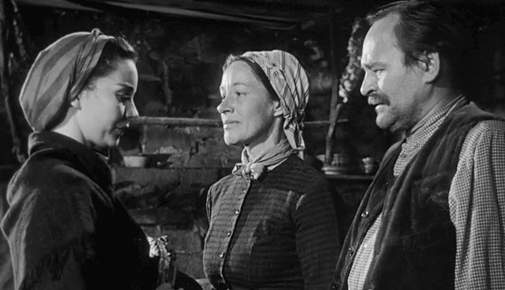
Anne Revere as "Louise Soubirous" in The Song of Bernadette
Synopsis: The mother of a poverty-stricken family is horrified but then fiercely loyal when her daughter claims to have seen a heavenly vision.
Stats: Then 40 yrs old, 15th film, 6th billed. 1st of 3 nominations. 20½ minutes of screentime (or 13% of running time.)
Yaseen Ali: Louise’s brutal, violent interactions with her children make a lasting impression in this sleepy affair… but that relentless exasperation doesn’t leave her with anywhere else to go. There are just as many moments where she simply throws up her hands and recites a line about how much there is to do around the house. Revere has an electric outburst midway through where she mourns a burnt dinner and strikes Bernadette. Past the hour mark, she’s largely relegated to the background (and disappointingly conflated with her daughter’s anonymous crowd of spellbound admirers). ♥♥
Kristen Lopez: This is the performance that should have won, hands down. Revere’s character is heartfelt, beautifully understated, and quiet. In a movie about the power of faith, Revere’s character exudes that in every scene without saying a word; she shows the faith of love for her children, especially her tormented daughter, Bernadette. It’s a performance that epitomizes support as she’s there for the main character. Every scene Revere has is lovely and I think the Academy failed to see that. ♥♥♥♥
Rebecca Pahle: I mean….. sure? Anne Revere plays Bernadette’s mother, at turns supportive of her child and sort of gruffly wishing she’d just get over it and stop causing their family so much drama. It’s a semi-understated performance in a very not understated movie—has Vincent Price, playing the Imperial Prosecutor, ever been in an understated movie?—and as such it doesn’t do much. Her chemistry with Jones is good. It’s a pretty boring role. ♥♥
Kieran Scarlett: Mother characters and the Supporting Actress category often go hand-in-hand. Like many mother roles before and after, this gives Revere a lot of opportunities for scenery chewing as she expresses both frustration with and protectiveness of her embattled daughter. It's not the most unique character arc or characterization and she often dips into melodrama, which feels unavoidable given the nature of the film. However, in quieter moments—like comforting a weeping Bernadette in the middle of the night—we see glimpses of a subtle warmth that might have been more foregrounded in more emotionally complicated film. She doesn't reach greatness, but she's fine. ♥♥♥
Nathaniel R: Immediately grounding, doing more than the rest to sell years of desperate poverty with her harried business and overall fussing. Her quick temper and anger at Bernadette's imagination - forbidding her to pursue the visions - feels authentic and earned. But once Louise loses her resolve and chooses loyalty over discipline, the performance has literally nowhere else to go. She'll just be there to the side of the frame, fretting while vaguely admiring her stubborn daughter. You can count on her for that. ♥♥
Reader Write-Ins: "She has so much conviction protecting her daughter from the town’s ridicule. Her face says so much without saying a word." - Tom F. (Reader average: ♥♥½)
Actress earns 15½ ❤s
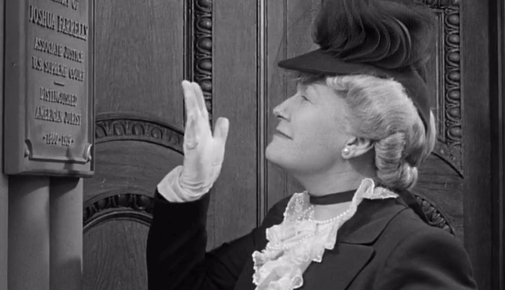
Lucille Watson as "Fannie Farrelly" in Watch on the Rhine
Synopsis: The generous grandmother of a wealthy family welcomes her daughter and son-in-law into her home after a long absence. Her sheltered American life is in for a quick awakening as they've been anti-fascists fighting Nazis all over Europe.
Stats: Then 64 yrs old, 17th film, 4th billed. 1st and only nomination. 46 minutes of screentime (or 40% of the running time).
Yaseen Ali: Minutes in, Watson doesn't instil much confidence; preparing the household for visitors, she barrels through each line with nary a beat. Whether shouting at the beleaguered help or calling herself dried cork, I feared the performance would soon stagnate. But at a key reveal midway through, Watson’s Fanny is rendered near speechless. The furrowing of her brow and sombre reactions etch the inner crumbling of a matriarch, who, for the first time, is powerless to protect her family from certain downfall. Though the "magnolias" line is canon, a full extra star for how she draws her hand away from an offering of comfort from Paul Lukas – not so much a rejection, but a stunned realization of her complicity in a third-act twist. ♥♥♥
Kristen Lopez: Bette Davis has the supporting role in this, but it’s just not true because she overshadows everyone in this movie. Watson is a grand dame who is fun to watch, and her transformation towards realizing what is happening in Europe is beautifully conveyed. But it’s a performance that’s just there to be “supportive.” There’s little color to it because the other characters are worth watching. It seems like Watson was just brought along for the ride considering Paul Lukas’ nomination. ♥♥
Rebecca Pahle: Every time I try to think about this movie, I forget A) what the title is and B) who was nominated for it… which tells you just about all you need to know. Coming out as it did in the middle of World War II, it’s easy to see why its message was powerful at the time. Now it just comes across as snoozy and over-the-top. Her performance is workmanlike--competent, but more or less unmemorable. There are no little nuances that make you want to know more about this character. I genuinely don’t get why she got a nomination. ♥
Kieran Scarlett: Of all the performances nominated, this one surprised me the most in that it started off rote. I felt very convinced in the film's early moments that all we were getting was the eloquently sharp-tongued grandmother archetype—one whose well-constructed shade purposely doesn't fully register until moments after she's majestically glided out of the room. But, she manages to organically build in true maternal chemistry with Bette Davis' and a well-conveyed ethical compass that doesn't feel overly moralizing. It's solid, entertaining and funny work. ♥♥♥
Nathaniel R: Though Watson doesn't convince me that her character was once a great desired beauty, despite frequent references to her glory years, she ably hits other details the screenplay suggests about her, especially the affectionate/annoyed responses of her family. This is a simplistic bossy matriarch role but I dug that Watson knew when to pull back even though Fanny never does. Note the way she goes quieter / stiller when she's having a moment where she's really taking in a conversation or someone's character rather than talking at them. She's amusing but I wish there was more shading, especially given all that camera time, and I wish there was more differentiation in her comic line readings. ♥♥
Reader Write-Ins: "Her pleasantly bossy and perky aristocrat is a joy to watch. But then the drama kicks in and she handles it by just... frowning a bit." - Jacob (Reader average: ♥♥¾)
Actress earns 13¾ ❤s
Katina Paxinou took the Oscar for the year's most popular film
but in a tight race with split opinions and limited enthusiasm...
Paulette Goddard surprises, winning the Smackdown!
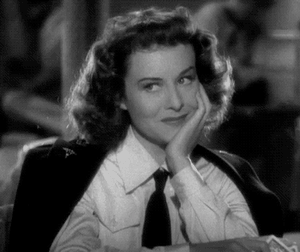
We hope you enjoyed this event.

Want more? Listen to the Podcast conversation.
Previous Smackdowns: 1941, 1944, 1948, 1952, 1954, 1963, 1964, 1968, 1970, 1973, 1977, 1979, 1980, 1984, 1985, 1989, 1994, 1995, 2003, 2016, and 2017 (prior to those 30+ Smackdowns were hosted @ StinkyLulu's old site)
NEXT UP? 1972 on August 26th. So watch those five movies (Butterflies are Free, The Heartbreak Kid, Fat City, Pete n' Tillie, and The Poseidon Adventure) and join us for the discussion at the end of the month.